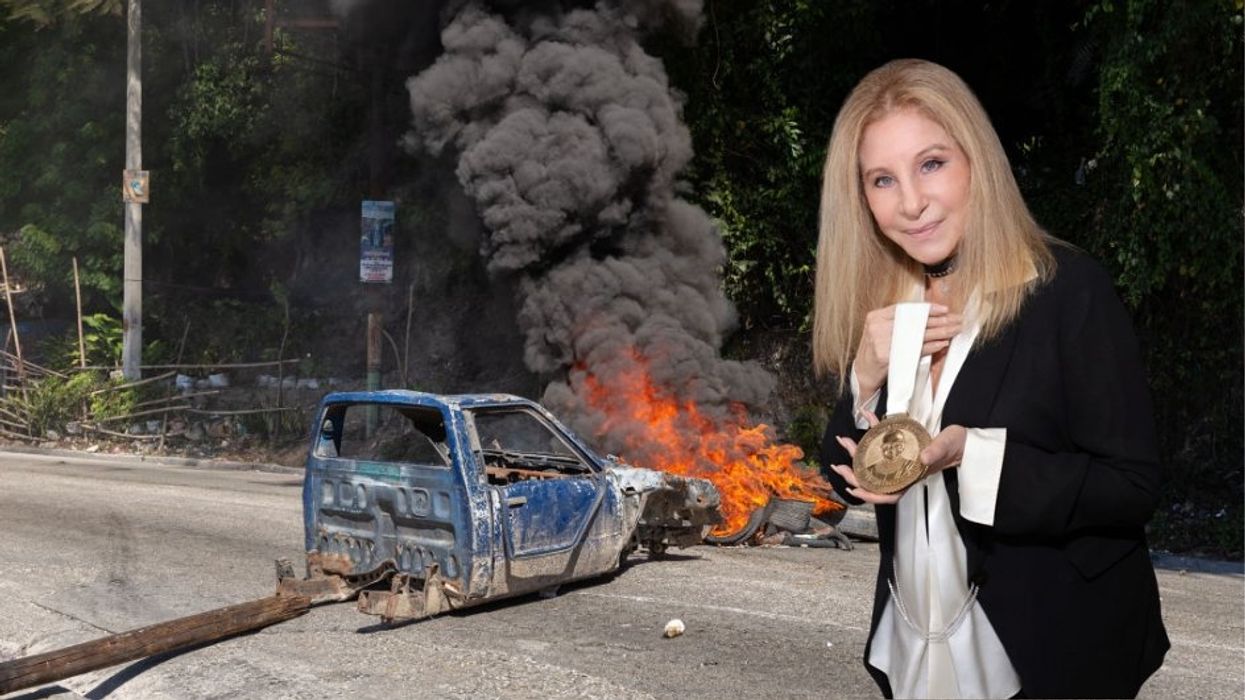Sen. Mark Begich (D-Alaska) said portions of his state could fall into the ocean because of global warming.
“I know when people talk about climate change they get nervous,” Begich said during a Senate Homeland Security Committee hearing Wednesday. “They want to debate the science. I’m telling you, climate change is occurring. My state is the example of it, of what the impacts are, and it is extreme and we are seeing the impacts economically, and from all levels.”
 This 2005 photo provided by Tony Weyiouanna Sr. shows a fallen building over a beach in Shishmaref, Alaska. Tony Weyiouanna remembers a time when people played baseball on the beach of his village on Alaska's western coast. Now, there's barely enough room for hopscotch on Shishmaref's eroding waterfront. Erosion is an escalating problem blamed on climate change. That message was relayed this week by Weyiouanna and four other residents from the small Inupiat Eskimo community who traveled to the nation's capital, armed with stories and a clump of eroding sod. (AP/Tony Weyiouanna Sr.)
This 2005 photo provided by Tony Weyiouanna Sr. shows a fallen building over a beach in Shishmaref, Alaska. Tony Weyiouanna remembers a time when people played baseball on the beach of his village on Alaska's western coast. Now, there's barely enough room for hopscotch on Shishmaref's eroding waterfront. Erosion is an escalating problem blamed on climate change. That message was relayed this week by Weyiouanna and four other residents from the small Inupiat Eskimo community who traveled to the nation's capital, armed with stories and a clump of eroding sod. (AP/Tony Weyiouanna Sr.)
Begich pointed to studies from both the Army Corps of Engineers and the Government Accountability Office that found threats facing Alaska villages due to extreme weather.
“Many of these villages have experienced incredible, extreme weather,” Begich said at the hearing, titled, "Extreme Weather Events: The Costs of Not Being Prepared." “Thirty villages are at risk of literally falling into the ocean or disappearing totally.”
Committee Chairman Tom Carper (D-Del.) sought to put off a discussion of climate change or global warming, but didn’t take it off the table.
“For years I’ve been working with a number of our colleagues to address the root causes and unfolding effects of what I believe is one of the biggest challenges of our generation, climate change,” Carper said. “According to the U.S. global change research program, extreme weather events have increased in frequency over the last 50 years or so and are expected to become even more common, more intense and more costly. But let me just make a point if I could, today’s hearing is not to hash out climate science. That’s not what we’re trying to do. Instead it’s about trying to find common ground.”
Witnesses from federal and state agencies made only scant references to climate change, such as when Homeland Security Assistant Secretary for Policy David Heyman said 36 states have climate plans.
“The projected impacts of climate change, including sea level rise and increasing severity and frequency of extreme weather events, can cause damage or disruptions that result in cascading effects across our communities, with immeasurable costs in lives lost and billions of dollars in property damage,” Heyman said.
Carper said Superstorm Sandy cost the economy $75 billion, while the wildfires in 2013 cost the economy more than $1 billion. He cited a GAO analysis to assess “climate change as one of the biggest fiscal risks facing our country.”
“Unfortunately, extreme weather seems to be the new norm,” Carper said. “Events like Superstorm Sandy, which came to our shores in the Mid-Atlantic a year or so ago and recent wildfires in other parts of the country, dangerous tornadoes, historic droughts — it may well be just the tip of the iceberg of what’s to come. And even today, the East Coast is preparing for yet another snowstorm, while the West Coast is experiencing a historic drought and increased fire danger with no end in sight.”
Follow Fred Lucas (@FredVLucas3) on Twitter.

 This 2005 photo provided by Tony Weyiouanna Sr. shows a fallen building over a beach in Shishmaref, Alaska. Tony Weyiouanna remembers a time when people played baseball on the beach of his village on Alaska's western coast. Now, there's barely enough room for hopscotch on Shishmaref's eroding waterfront. Erosion is an escalating problem blamed on climate change. That message was relayed this week by Weyiouanna and four other residents from the small Inupiat Eskimo community who traveled to the nation's capital, armed with stories and a clump of eroding sod. (AP/Tony Weyiouanna Sr.)
This 2005 photo provided by Tony Weyiouanna Sr. shows a fallen building over a beach in Shishmaref, Alaska. Tony Weyiouanna remembers a time when people played baseball on the beach of his village on Alaska's western coast. Now, there's barely enough room for hopscotch on Shishmaref's eroding waterfront. Erosion is an escalating problem blamed on climate change. That message was relayed this week by Weyiouanna and four other residents from the small Inupiat Eskimo community who traveled to the nation's capital, armed with stories and a clump of eroding sod. (AP/Tony Weyiouanna Sr.)


